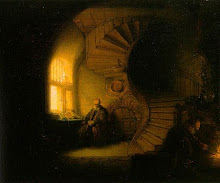Sometimes
a book begins to talk to me from across the room and I have to go see who it
is, whose words are catching my interest and pulling me toward it, why it’s Ted
Berrigan, who tells me that a voice once locked in the ground now speaks in me,
quote unquote. Wow, Ted, that’s cool, but kind of weird. What kind of a voice
was it? Male? Female? Bass? Tenor? Soprano? Did it vibrate in your bones with
the thunder of prophecy? Or was it more regal and phantasmal, like the ghost of
Hamlet’s father appearing to him out of the Danish fog?
He
does not say. But fortunately, there are many other poems to choose from, for
these are The Collected Poems of Ted
Berrigan, and there are many other books on my shelves to read, to conduct
a conversation with, books to make me think, look differently at the world,
which is what a book should do, ideally, that is to say lengthen in the mind,
gathering phenomena, things like rocket propellant and signet rings, the sighs
of lovers and the snorts of kings, the gaze of sockeye salmon and the luster of
quartz. The spherical embryonic mass of blastomeres forming before complete
blastulation is an unexpected delight, a true delicacy for the eyes and mind,
and similar to the gestation of an idea, the folds and mosaic of suspension in
moral problems causing no end of mercurial pizzazz, whole place kicks of
thought sent whirling into the atmosphere and bouncing off the roof of the
skull, in which the meaning accrues in resonance, and beauty, and starts
migrating toward completion in a sentence.
It is, thus, a question of knowing
if philosophy as a reconquest of raw, primordial being can fulfill itself by
the means of eloquent language, or if it wouldn’t be necessary to make a usage
of it which removes from it its power of immediate or direct signification in
order to equal what it truly and fully wants to say.
- Maurice Merleau-Ponty, The Visible and
the Invisible
I
wanted to be a cowboy until I was forty-two, and so became a philosopher of the
plains, and walked out of the house of language into a frontier I was unable at
first to fully identify, and of course it rained, and I got wet, but the
miracle of lightning is worth it, completely amazes the eyes when the world
goes dark, then flashes into view, and for a brief second you can see the
rawness of existence, the wonder of it all, why anything exists at all, where
there is something instead of nothing, and so grow to a point.
If we are ourselves in question in
the unreeling of our life, it isn’t because a central non-being menaces at each
instant to repeal its consent to being, it is because we are one continual sole
question, a perpetual endeavor to restore ourselves by the constellations of
the world, and the things of our own dimension.
– Maurice Merleau-Ponty, The Visible and the Invisible
All
my life I have been awash, glittery, obscure, mirthful, and catalytic. Perception
has been a central fascination. Why does a cuticle transcend its condition as
hardened skin at the base of a fingernail and become a frontier of problems in
the exhortations of a poem based on the cry of a clarinet? Because it drags
itself across the consciousness seeking pencils and philodendrons.
Days
are nourished by insurrection. Scrambled eggs and a piece of toast slathered
with blackberry jam. Odors sew themselves into advocacies of further
refrigeration.
Do
I rebel? Yes, I rebel. Against what? you may ask. Whatta you got? I may reply.
My
messy red heart puts on a blue shirt and goes around saying things like
nothingness is nothing until it is something and then it isn’t nothingness so
much as somethingness.
What
sky out there is doing push-ups on the lawn? In doing so stars release energy,
which is how they shine, but as the push-ups continue, each star forges atoms
of carbon, oxygen, neon, sodium, magnesium and silicon, then nickel, cobalt,
and, finally, iron. It is thus that a new Philosophy
is produced, and that a woman’s love is like the morning dew.


No comments:
Post a Comment